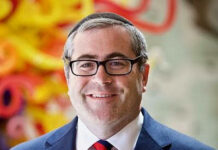
Jewish TikTok executive Michal Oshman will appear virtually at Ohev Shalom of Bucks County on Nov. 14. to promote her self-help book, “What Would You Do If You Weren’t Afraid?”, which came out in May and is rooted in Jewish wisdom.
Ohev Shalom Rabbi Eliott Perlstein Facebook messaged Oshman over the summer to invite her. The Israeli author, who lives in London, agreed to do a virtual event.
The free talk begins at 10:30 a.m. and requires masks and vaccinations for entry.
“I felt like the rabbi and I had similar areas of interest, like personal growth and creating a sense of belonging,” Oshman said.
Perlstein discovered the title while looking on a Jewish website for a Torah commentary. Among cover pictures featuring rabbis with long beards, Oshman’s young, fresh-faced smile jumped out.
Perlstein looked at what the book was about and ordered it. After reading it, he used Oshman’s Jewish wisdom in a Yom Kippur sermon.
The rabbi told congregants to heed two lessons. Life is a narrow bridge and, to get across, you must walk one step at a time. And by creating the world, God was making space for humans, meaning God wasn’t everything anymore.
It was a reminder that you shouldn’t try to be everything yourself, Perlstein said. Handle your role, and allow others to handle theirs.
“In terms of Judaic content, she was right on,” he said.
For Oshman, the book was the culmination of her journey to a religious life.
The head of culture, diversity and inclusion at TikTok Europe grew up in a Jewish household in Israel.
Her identity was never in doubt. But her spirituality was, she said.
Her grandparents were all Holocaust survivors. And the grandparent she was closest with, her maternal grandmother Chana Kaiserman, painted a vivid picture of her journey to survival.
Kaiserman jumped off a train to Auschwitz and hid in a pig barn in Poland. When the Nazis stormed the place, she hid behind farm equipment.
After they left, the farmer found Kaiserman, but she bribed him with a piece of gold she had hidden in her mouth. He let her stay in the barn until she made her way to Germany as the war ended.
There, in a refugee camp, she met Oshman’s grandfather and they moved to, as the author put it, “Israel before there was a state of Israel.” Kaiserman told her granddaughter this story over and over.
For Oshman’s grandparents, Judaism was about community and survival. But religious traditions, like Shabbat dinner, were nonbinding.
“There wasn’t a lot of warmth, positivity and joy,” the author said. “I thought we were supposed to live in sadness and guilt.”
Oshman is 46 and, at 38, she realized she needed some warmth, positivity and joy. She was a corporate executive, the wife to her husband, Yair Oshman, and a mother of four.
But her perfect life was built on a shaky foundation. One mistake at work or home could make her feel broken, like she was letting down her parents, she said. Therapy and medication weren’t helping much.
“I never considered that Judaism would have something for my mental health,” Oshman said.
But then she read “Man’s Search for Meaning” by Viktor Frankl and “anything written by Jonathan Sacks.” She also googled the meanings of Jewish holidays.
In the process, Oshman made an illuminating discovery.

“I had a Godly soul,” she said. “It gave me a sense of connection to something much larger than me.”
Slowly, she brought that sense to her family. The Oshmans began sitting down for Shabbat dinners.
One year into that tradition, they started putting away their iPhones. Later, Yair Oshman invented “the compliment game.”
Everyone at the table had to give every other person a compliment. At first, the kids couldn’t come up with anything for each other. But a couple months in, they started to thank each other for help with homework and other deeds.
Recently, Oshman’s son told her that, “Now that I know what saying something nice is, I see it all the time. Compliments.”
Oshman said her grandmother would be proud. Before the Holocaust, Kaiserman had Shabbat dinner with her family every Friday night in their village.
“The second generation needed to survive, and the first,” Oshman said of her parents and grandparents. “Now we need to say, ‘Who are we?’”
[email protected]; 215-832-0740






